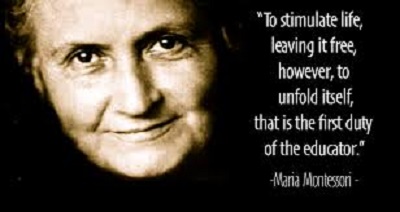Background
In 1906 an Italian physician named Maria Montessori conceived and developed a system of educating young children based on her observations and conclusions about how children learn. This system is commonly known as the Montessori Philosophy or just as often, the Montessori Method.
Dr. Montessori’s materials and methods were based on her belief that education involves the unfolding and development of the child’s innate abilities, talents and interests.
Dr. Montessori’s scientific and humanistic approach rapidly spread resulting in training programs and schools opening first in Europe and then all around the globe.
It wasn’t long before the first Montessori school was founded in the United States. Today there are currently over 3,000 independent and 130 public school systems using the Montessori method in the US alone.

